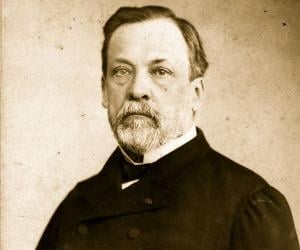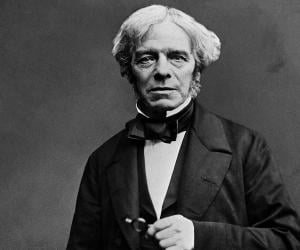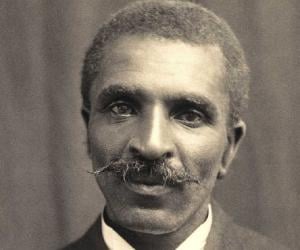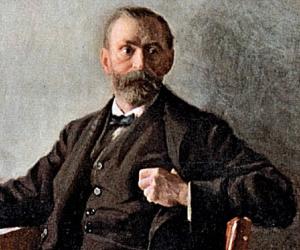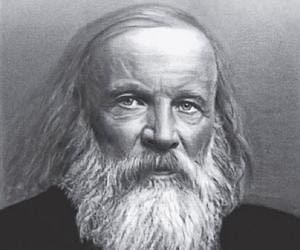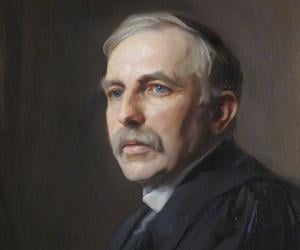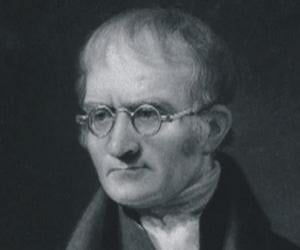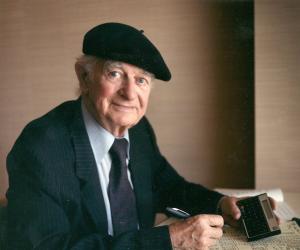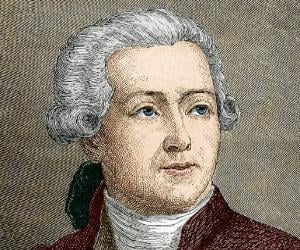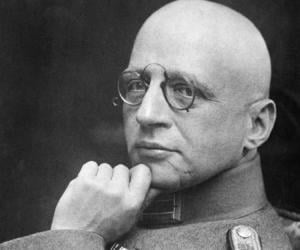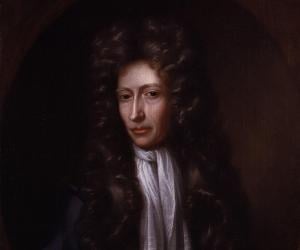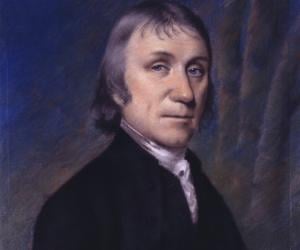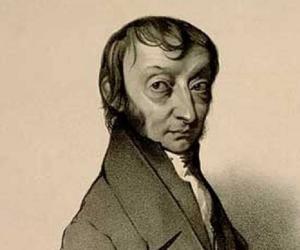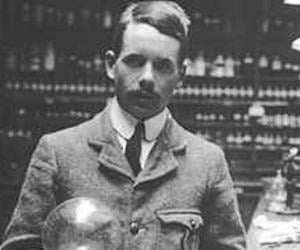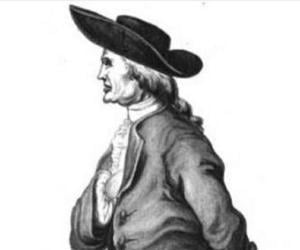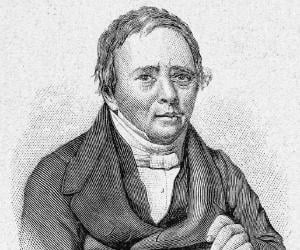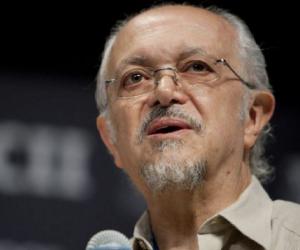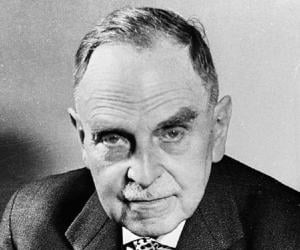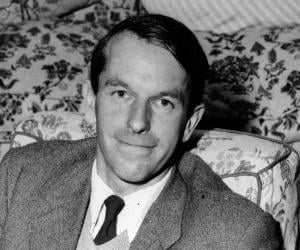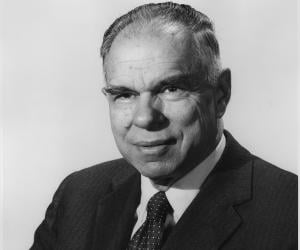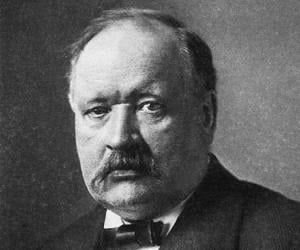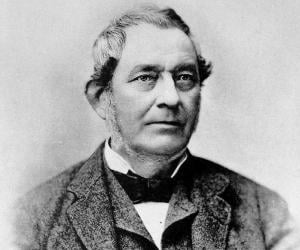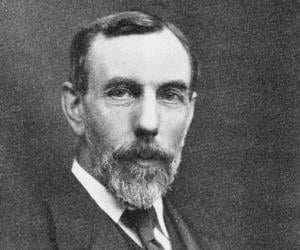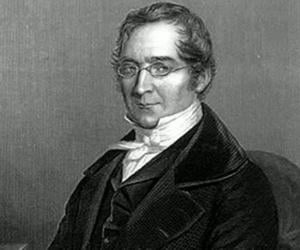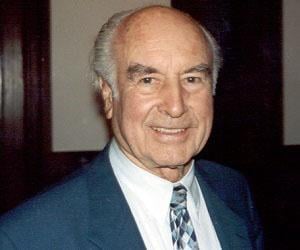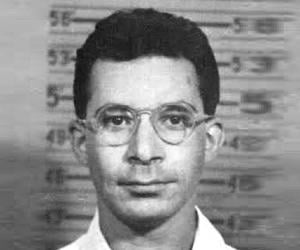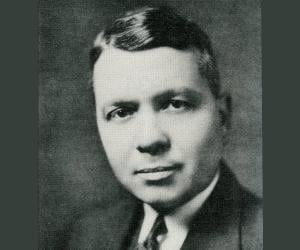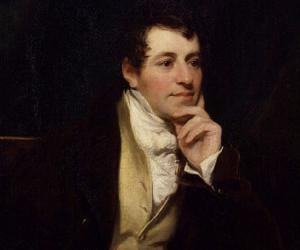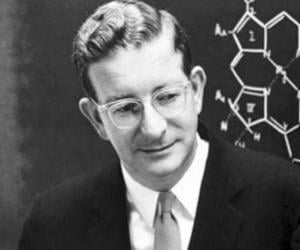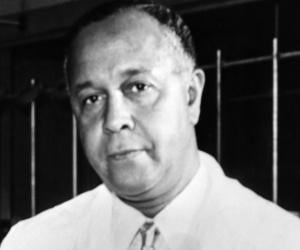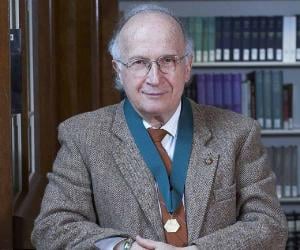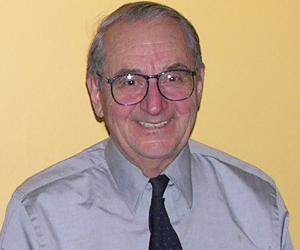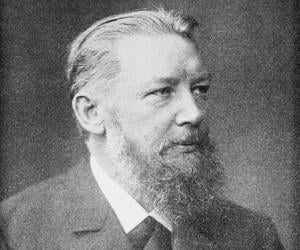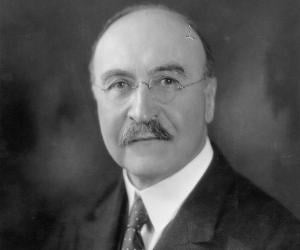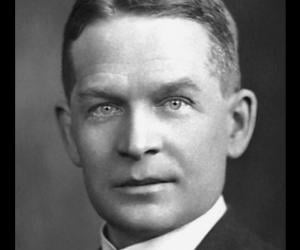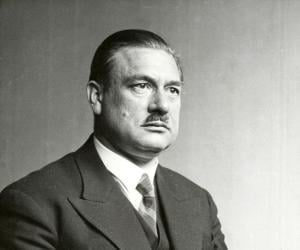Michael Faraday was an English scientist known for his contribution to the study of electrochemistry and electromagnetism. Considered one of the most influential scientists ever, Faraday's inventions of electromagnetic rotary devices established the basis for electric motor technology. His research also helped understand the concept of the electromagnetic field. Ernest Rutherford called him one of the greatest scientific discoverers ever.
Alfred Nobel was a Swedish chemist, engineer, and inventor. A prolific inventor, he held 355 different patents. Most popular as the inventor of dynamite, he was concerned with how he would be remembered after his death and bequeathed his fortune to the Nobel Prize institution. A wide traveler, he was proficient in several languages.
New Zealand physicist Ernest Rutherford is remembered as the father of nuclear physics. His discovery of radioactive half-life and of radon, and his differentiation of alpha and beta radiation, won him the Nobel Prize in Chemistry in 1908. Element 104 was named rutherfordium in his honor.
John Dalton was an English chemist, physicist, and meteorologist most famous for introducing the atomic theory into chemistry. He also contributed a lot to the study of color blindness, sometimes referred to as Daltonism in his honor. He was the first scientist to refer to the smallest particle of matter as an “atom.” He was a Quaker and lived modestly.
Only person to win two unshared Nobel Prizes, Linus Carl Pauling was an American theoretical physical chemist, who received the 1954 Nobel Prize in Chemistry for his work on nature of chemical bond and 1962 Nobel Prize for Peace for his efforts to stop nuclear weapon testing. Also a prolific writer and educator, he has published 1,200 books and papers.
Antoine Lavoisier was a French chemist and nobleman. He played a crucial role during the chemical revolution of the 18th-century. Widely regarded as the father of modern chemistry, Lavoisier had a major influence on the history of biology as well as the history of chemistry. He also helped build the metric system.
Fritz Haber was a German chemist who was honored with the prestigious Nobel Prize in Chemistry for inventing the Haber-Bosch process. The process is used widely to synthesize ammonia from hydrogen gas and nitrogen gas. For his pioneering work in weaponizing poisonous gases like chlorine during World War I, Haber is referred to as the father of chemical warfare.
Robert Boyle was an Anglo-Irish chemist, natural philosopher, inventor, and physicist. Regarded as the first modern chemist, Boyle is often counted among the founders of modern chemistry. One of the pioneers of the scientific method, Robert Boyle is also remembered for his books, including The Sceptical Chymist, which is viewed as a keystone book in chemistry.
Best remembered for his contribution to the chemistry of gases, Joseph Priestley was an English scientist, clergyman, political theorist and educator, who has been credited with discovering oxygen independently, publishing his findings before Carl Wilhelm could. A prolific writer, he has authored 150 works on various subjects including electricity. He also contributed immensely to the advancement of political and religious thoughts.
Son of a reputed senator and lawyer in Italy, Amedeo Avogadro was himself a qualified lawyer. However, he later delved into research as a mathematical physicist and is best remembered for laying down the Avogadro’s law, contributing to the molecular theory of gases. The Avogadro constant is named after him.
Henry Moseley was an English physicist best known for his development of Moseley's law in X-ray spectra. He made major contributions to the fields of atomic physics, nuclear physics, and quantum physics. He was working at the University of Oxford when World War I broke out, following which he went to volunteer for the Royal Engineers of the British Army.
English natural philosopher, scientist, and a prominent experimental and theoretical physicist and chemist Henry Cavendish is best-remembered for his discovery of hydrogen and his Cavendish experiment. He first recognized that hydrogen, which he termed inflammable air, is a discrete substance which produces water on combustion. He conducted the Cavendish experiment to measure and produce a value for Earth’s density.
Hans Christian Ørsted was a Danish chemist and physicist. He was the first person to discover that electric currents can be used to create magnetic fields. His discovery was the first relationship found between magnetism and electricity. Oersted, the unit of the auxiliary magnetic field H, is named in his honor.
Mario J. Molina was a Mexican chemist who played a key role in understanding and explaining the threat from chlorofluorocarbon (CFC) gases to the Earth's ozone layer, which earned him the prestigious Nobel Prize in Chemistry in 1995. Molina was the third Mexican-born Nobel laureate and the first Mexican-born person to win a Nobel Prize in Chemistry.
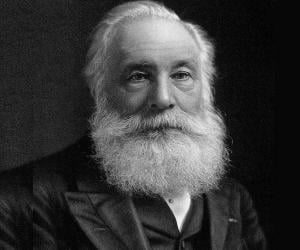
William Henry Perkin is best remembered for his chance discovery of the dye mauveine, made of aniline purple. He had apparently discovered the dye while attempting to synthesize quinine. The Royal Medal-winning British chemist also studied salicyl alcohol and flavoring agents and synthesized the first artificial perfume.
Frederick Sanger remains one of only two people to have won the Nobel Prize twice in the same category. The British biochemist is remembered for his ground-breaking work on nucleic acids and the insulin molecule. The son of a Quaker medical missionary, Sanger, too, grew up believing in Quakerism.
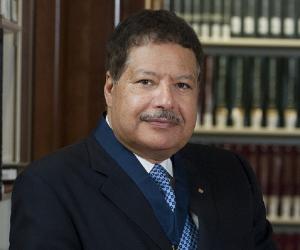
Glenn T. Seaborg was an American chemist who shared the 1951 Nobel Prize in Chemistry with Edwin McMillan for discovering the first transuranium elements. He also authored or co-authored several books and articles, including 500 scientific journals. In 2005, Glenn T. Seaborg was inducted posthumously into the National Inventors Hall of Fame.
Svante Arrhenius was a Swedish scientist who became the first Swedish person to win a Nobel Prize when he won the Nobel Prize for Chemistry in 1903. Although he was originally a physicist, Arrhenius is widely accepted as a chemist and is best remembered for co-founding physical chemistry. Stockholm University houses the Arrhenius Labs, which is named in his honor.
Chemist Robert Bunsen paved the path for spectrum analysis with his discovery that every element emits a light of a particular wavelength. He also co-developed and lent his name to the Bunsen burner. He almost died of arsenic poisoning and lost sight in his right eye in a laboratory explosion.
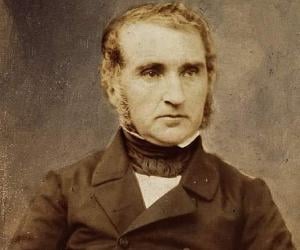
German chemist Justus von Liebig is best known for his research on organic compounds and his contribution to biochemistry and agriculture. The Copley Medal-winning scientist initially studied pharmacy but later switched to chemistry. As a professor, he stressed on laboratory-based teaching of chemistry and separating it from pharmacy, opposing traditional methods.
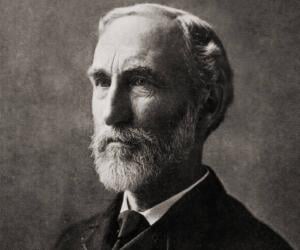
Josiah Willard Gibbs was an American scientist best remembered for making major theoretical contributions to mathematics, physics, and chemistry. As a mathematician, Gibbs is credited with inventing modern vector calculus. In 1901, he was honored with the prestigious Copley Medal for his contributions. Josiah Willard Gibbs's work had a major influence on physicists like J. D. van der Waals.
The son of a civil engineer, Nobel Prize-winning Scottish chemist William Ramsay revolutionized science with his pathbreaking discovery of the noble gases, thus forming an entirely new segment of the periodic table. He is also remembered for his long association with UCL. He was knighted for his achievements.
Known for his pathbreaking Gay-Lussac's Law, French chemist-physicist Joseph Louis Gay-Lussac was also the first, along with his colleague Alexander von Humboldt, to discover that water is composed of one part of oxygen and two parts of hydrogen. His name is one of the 72 that adorn the Eiffel Tower.
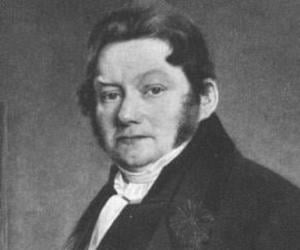
Jöns Jacob Berzelius was a Swedish chemist who is often counted among the founders of modern chemistry alongside Robert Boyle, Antoine Lavoisier, and John Dalton. He is also referred to as the Father of Swedish Chemistry. Jöns Jacob Berzelius is also credited with making immense contributions to the field of stoichiometry. In 1836, he was honored with the Copley Medal.

August Kekulé was a German organic chemist. Regarded as one of the most important chemists in Europe, Kekulé is credited with founding the theory of chemical structure, including the Kekulé structure of benzene. Kekulé is also credited with teaching future Nobel Prize winners, Jacobus Henricus van 't Hoff Jr., Hermann Emil Louis Fischer, and Johann Friedrich Wilhelm Adolf von Baeyer.
Swiss chemist Albert Hofmann was the first known person to synthesize the psychedelic effects of lysergic acid diethylamide (LSD). Interested in science from a young age, he studied chemistry at the University of Zürich. As a chemist, he conducted several significant studies and authored more than 100 scientific articles and books. He was a recipient of the prestigious Scheele Award.
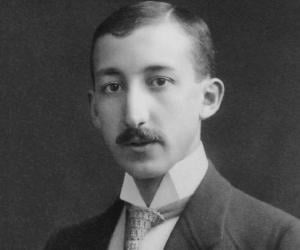
Nobel Prize-winning Hungarian-Swedish chemist George de Hevesy is best remembered for his research on isotopic tracer techniques to study animal metabolism. He is also credited with co-discovering the element hafnium with physicist Dirk Coster. He fled the Nazi regime and moved first to Denmark and then to Sweden.
Harold Urey was an American physical chemist best remembered for his pioneering work on isotopes. He is credited with the discovery of deuterium, for which he received the prestigious Nobel Prize in Chemistry in 1934. Harold Urey also played a key role in the development of the infamous atom bomb.
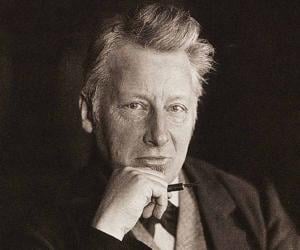
Jacobus Henricus van 't Hoff was a Dutch physical chemist best remembered for winning the first Nobel Prize in Chemistry. Van 't Hoff's work helped found the modern theory of chemical thermodynamics, chemical kinetics, chemical equilibrium, and chemical affinity. A highly popular theoretical chemist, Van 't Hoff is also counted among the founders of physical chemistry.
Best remembered for his invention of the Davy lamp, a safety lamp for miners, Humphry Davy initially aspired to be a doctor but later deviated to chemistry. The Copley Medal winner had co-founded the Zoological Society of London. He also excelled in writing poetry and loved fishing.
Robert Burns Woodward was an American organic chemist best remembered for winning the 1965 Nobel Prize in Chemistry. Regarded as the most preeminent synthetic organic chemist of the 20th century, Woodward is also remembered for his contributions to organic synthesis. Robert Burns Woodward was also the recipient of the Copley Medal, National Medal of Science, and William H. Nichols Medal.
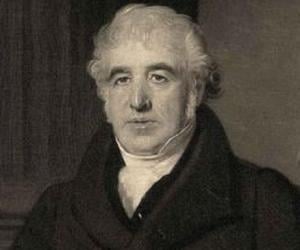
Percy Lavon Julian was an American chemist whose work paved the way for the production of birth control pills and corticosteroids. Julian went on to start his own company which helped reduce the price of steroid intermediates. In 1973, Percy Lavon Julian was inducted into the National Academy of Sciences and became the first African-American to receive this honor.
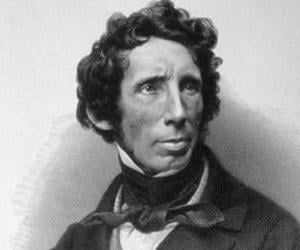
Friedrich Wöhler was a German chemist best remembered for his contribution to the field of inorganic chemistry. He was the first person to isolate the chemical elements yttrium and beryllium in pure metallic form. Friedrich Wöhler was also the first person to prepare many inorganic compounds such as silicon nitride and silane.
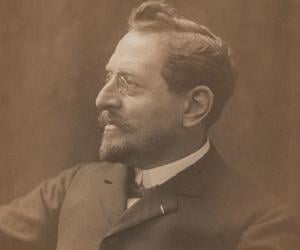
Sergei Mikhailovich Prokudin-Gorskii was a photographer and chemist of the Russian Empire. Prokudin-Gorskii is remembered for his effort to capture early 20th-century Russia and his groundbreaking work in color photography. From 1909 to 1915, Prokudin-Gorskii traveled across the Russian Empire, documenting several of its aspects. After his death, many of his negatives were taken to the U.S. Library of Congress.
Wilhelm Ostwald was a Baltic German philosopher and chemist who is credited with co-founding the field of physical chemistry. A polymath, Ostwald made significant contributions to philosophy, art, and politics, especially after his retirement from academic life. His contributions to the fields of reaction velocities, chemical equilibria, and catalysis earned him the 1909 Nobel Prize in Chemistry.
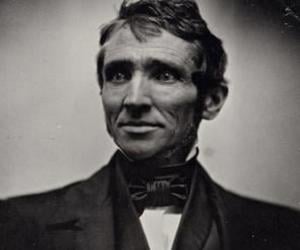
Charles Goodyear was an American manufacturing engineer and self-taught chemist who developed vulcanized rubber. He invented the chemical process to manufacture pliable, moldable, and waterproof rubber which revolutionized the automobile industry. In 1976, Charles Goodyear was inducted posthumously into the National Inventors Hall of Fame.
Industrial chemist Leo Baekeland is remembered as The Father of the Plastics Industry for creating Bakelite, the first synthetic plastic of the world, thus marking the beginning of the Polymer Age. His many inventions include Velox, a special photographic paper, the rights of which he sold to George Eastman.
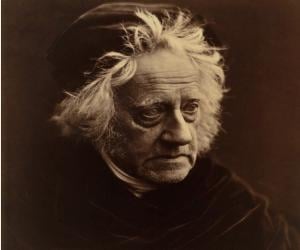
The son of renowned astronomer William Herschel, John Herschel was educated at Eton and Cambridge and grew up to be a polymath. Apart from contributing to the field of photography, he was known for cataloguing and naming stars and satellites. He briefly also served as the Master of the Royal Mint.
Peter Debye was a Dutch-American physical chemist and physicist. He is best remembered for winning the 1936 Nobel Prize in Chemistry. He was also the recipient of the Rumford Medal, Franklin Medal, and Priestley Medal. In 1965, Peter Debye was honored with the National Medal of Science. In 1982, he was inducted into the Alpha Chi Sigma Hall of Fame.

Renowned James Lovelock is best known for propagating the Gaia hypothesis, which states that every living being on planet Earth is part of a single self-regulating superorganism. He is also known for his long association with NIMR, London, and Harvard University and has over 50 patents under his name.
